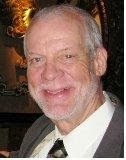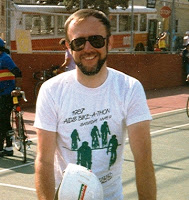When many people think of the so-called “gay lifestyle,” they very often have a stereotypical picture of gays frequently hanging out for hours in gay bars, drinking, and picking up tricks, one-night stands just for sex and without much regard for getting to know the person any better. At least, that may be the more visible aspect of some gays’ lives, but I know that this is not true with many others. Some have dinners and parties in their homes rather than going to bars. I found this to be especially true in cities that were less tolerant, such as Cincinnati at the times I visited there. That community was in some ways rather southern and conservative, and they did not tolerate gays very well. Many other gays spend more time in activities such as going to movies, plays, or concerts. Some engage in active pursuits such as sports or hiking in the mountains, just like many other people. Still, the bar scene seems to be one image that often comes first to some people’s minds.
The idea of going to bars as a major means of having fun never has been my point of view. My tastes always have been very different. I occasionally can enjoy an alcoholic drink just for the taste, but I don’t need more than one to enjoy that taste. I never have needed to get an alcoholic buzz, either. Plus, I did not care to lose more brain cells than I already was losing from the toxins in our water, food, and air.
And speaking of toxic air, that went for heavy cigarette smoke, too, the usual atmosphere of bars when I was young. The few times that I ventured into bars at the request of friends, my lungs felt as though I had sand in them by next morning.
I never went to bars looking for anonymous sex in basements. I also never cared to dress up either in drag or butch-drag. My point of view is that genuineness is preferable to affectation.
I also have a very different point of view when it comes to choosing music to listen to. I never cared for ear-splitting pounding drums and screaming. I know that many people seem to enjoy loud noise, but I now feel vindicated by all the medical studies that document the physical and mental harm from exposure to atavistic drivel foisted upon us by rock-noisicians. I realize that more civilized music is regarded by many to be boring, and they would complain if that were played in bars.
Still, when I was young and first met some gay people, I was persuaded to go to a few bars just for the camaraderie. A few of the places were relatively civilized. The only gay bar in my hometown had been made out of a small garage some distance from the downtown. It was run by a couple of older, friendly guys who tried to keep the prices of all the drinks, hard or soft, very low. They never made much money, and eventually the bar had to close.
The most comfortable bar that I remember was one that two friends of mine and I found as we traveled through Allentown, Pennsylvania. The bar was unusual because it had been a small branch-library and was situated in a pleasant, residential area rather than, as happens so often, in a less desirable location. It had ample parking in a large lot where cars were safe. The building was in the shape of an “H” with the entrance facing the middle reference desk, which had been turned into the bar. To the right in one end of the “H” was a large dance floor with dancing music. At the opposite end of the building was a large, quiet lounge with comfortable chairs and couches where friends could talk with each other without having to shout.
And finally, the spookiest experience that I had at a bar was when my friend Jim drove me many miles to a bar in a town in central Ohio. It was located in an older, urban area, and originally had been built for some other kind of business. There was a small entrance room, which was not lit very brightly, then a hall that led past restrooms and storage, and then finally a long area in back where the barroom was located.
The time was around twelve-thirty that night when Jim and I decided to leave. As we started to pass through the empty, front room, a lone figure approached out of the shadows. We saw that he appeared to be much too young to have been permitted into the bar, and he had not ventured farther back into the barroom. He appeared to be about fifteen. He spoke to Jim, but in a tone of voice that actually surprised us because it sounded angry and bitter. He said, “I’m chicken!” He seemed to glare at us with that announcement. Jim and I looked at each other somewhat confused by the intensity of his voice. I noted that he was good-looking, but I also was startled by the apparent fury and bitterness in his eyes. He seemed to be a very stressed and unhappy person. The intensity of his look stunned me.
Jim got over his initial surprise and said, “What?” The boy repeated his angry statement, “I’m chicken!” And then he added, looking only at Jim, “I have a hotel room nearby.” Jim, who always was the far more adventuresome person than I, turned and looked at me, seeming to communicate that he was attracted to this good-looking kid, would like to go with him, but at the same time, realized I that I would have no transportation. So, Jim, perhaps regretfully, declined the offer and said that we had a long way to drive and needed to leave now. As we left, I still was amazed and mystified by that very strange encounter.
It was some years later that I saw that face again, those intense eyes. I saw that face in newspaper photographs and on the TV. The image was immediately recognizable. Ever since then, I never could forget what a bizarre encounter Jim and I had had with this person and how close Jim possibly came to learning more about this strange kid than Jim would have wished to learn, even though what the kid became noted for began three years later. I clearly remembered the pained expression on that face, the intense bitterness in those eyes. And when I learned his name, I never have forgotten that either…Jeffrey Dahmer. Now there was someone with a very different point of view.
© 13 October 2013
About the Author
I have had a life-long fascination with people and their life stories. I also realize that, although my own life has not brought me particular fame or fortune, I too have had some noteworthy experiences and, at times, unusual ones. Since I joined this Story Time group, I have derived pleasure and satisfaction participating in the group. I do put some thought and effort into my stories, and I hope that you find them interesting.





